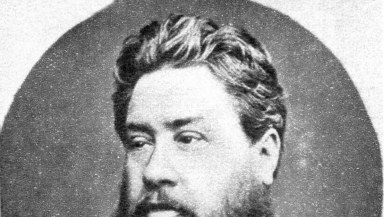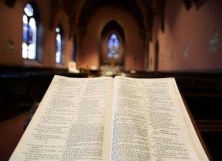
What makes a great sermon? Some people will talk about the preacher's skilful use of illustrations, some will value deep Bible knowledge, others will talk about the preacher's ability to relate the text to everyday life, while others will point to the indefinable sense of the Spirit's anointing.
These things are all true. But what's interesting is how our sense of what makes a great sermon has changed over the centuries. What strikes one generation as new, fresh and exciting is just tedious to another, or odd.
I thought of this while browsing through a fascinating book picked up for a few pence in a charity shop. Famous English Sermons, edited by Ashley Sampson, was published in 1942 and contains 16 sermons, beginning with the 7th-century Jarrow monk, the Venerable Bede, and ending with CS Lewis, whose wartime radio broadcasts were wildly popular. Among others it includes are Hugh Latimer, who was to be martyred, the famous poet John Donne, John Wesley and CH Spurgeon.
The interesting thing is to see how they changed. Those old preachers said things that wouldn't occur to us today. For instance, Bede points out that Peter is called "Bar-Jona", which means "son of a dove". Quite right, he says: "For the dove is without guile, and Peter followed his Lord in prudent and pious guilelessness." And the Spirit descended on Jesus in the form of a dove, so that works too. It's rather lovely, but it's not the sort of thing we'd say today.
Richard of Wimbledon, in 1388, used the parable of the labourers in the vineyard to talk about the different roles of priests, knights and labourers in society. It's a bit tenuous. Hugh Latimer (1552) preached on the Lord's Prayer. He scatters Latin about, but on the whole he is homely, witty and straightforward. There is a long and rambling story about a woman he visited in prison who was accused of murdering her child; it turned out she didn't do it and he got her set free, but it's not clear how the story relates to anything in particular.

John Donne's famous Death's Duel sermon is included; it was his last, and he preached it as he was not much more than a corpse, dying of cancer and in great pain. It's not easy, and there's even more Latin, but it's just wonderful. "Whether the gate of my prison be opened with an oiled key (by a gentle and departing sickness) or the gate be hewn down by a violent death, or the gate be burnt down by a raging and frantic fever, a gate into heaven I shall have..."
On the other hand, Jonathan Swift, the famous author of Gulliver's Travels, was a better novelist than preacher; his sermon on A Project for the Advancement of Religion and the Reformation of Manners just argues that the state ought to promote religion because it's useful.
I liked John Wesley's sermon on Temptation, which is full of stories. Some modern Methodists keep a copy of his Forty-Four Sermons to hand in case the preacher doesn't turn up, though I don't know how it would go down nowadays. John Henry Newman's on The Invisible World is excellent; he compares the world of animals to the world of angels. We move among animals and never think about how mysterious their world is – we don't know whether they can sin, whether they will be judged, whether they will survive death. Isn't this "as mysterious as anything which Scripture says about angels?"

Spurgeon preached a thunderous sermon on the Immutability of God, about eternal punishment, among other things. "When a million ages have rolled away, and you are exhausted by your pains and agonies, you shall turn up your eye and still read, 'SHALL BE DAMNED', unchanged, unaltered." And when we come to the later 19th and early 20th century we read very clever, erudite sermons indeed, from people like Henry Scott Holland and Campbell Morgan.
Would any of them still be preachable today? Not really, at least not as they stand. They might appeal to people of a literary bent, but the language and ways of thinking of even the most up-to-date of them are hard work. That's not to say that they aren't worth reading – there are good things in all of them – but they wouldn't grip a congregation today.
And this is quite telling, and we can learn at least three things from it.
First, sermons are temporary. We aren't producing something intended to last, and shouldn't be surprised or disappointed if it doesn't. Preaching is performance art. It might be recorded, either on paper or aurally, but its meaning is in the happening, not in the recording. Preachers who worry their congregations aren't learning from their sermons have got the wrong idea of what a sermon is. Think of it as a concert, not as a class.
Second, sermons are conditioned. A lot depends on the interplay between congregation, culture and the preacher himself or herself. So much of what we think of as "good preaching" depends on what we're used to. What would go down a storm in a Pentecostal-type church would bomb in a cathedral. A sermon that would be appropriate for an Anglican evensong would mystify an evangelical megachurch.
Third, sermons – at their best – are Spirit-filled. They are not just human productions, though they are the result of hard work and deep study. They come out of prayer, the preacher's and the congregation's, and attentive listening to God. God's Spirit takes inadequate words and makes them strong, even when on the printed page we might wonder why.
The power of the preached word through the ages has been enormous. Sermons have fed the hearts and minds of God's people in congregations large and small. Preachers have fearlessly judged kings and queens. Somehow, God has spoken.
Follow Mark Woods on Twitter: @RevMarkWoods
















